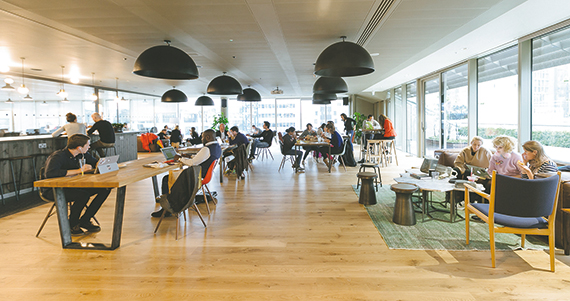The fallout from WeWork’s botched public debut is not likely to have a “detrimental impact” on the office market.
Developments since the failed initial public offering, which was withdrawn in September, “suggest that the risk of defaults within their existing leased portfolio are relatively minor”, according to UBS.
In its real estate outlook report for the first half of 2020, the bank highlighted the serviced office giant’s strong financial backing.
The report said: “The company still has powerful financial backers, and with the largest now taking an 80% stake in the business we have seen a clear shift away from the ambitious growth projects and a focus back on the core business. This essentially involves making the existing serviced office portfolio more efficient and profitable.”
In October, WeWork and SoftBank announced a deal that saw the the Japanese tech giant buy out around 80% of the real estate company.
UBS also pointed to reputational risk, arguing that WeWork cannot afford to fall out of favour with landlords: “It is important to remember that this entire business model rests on the company being able to do deals with landlords for office space across the world. Should the company default on any of their existing lease obligations they would immediately lose all credibility with landlords and make it extremely difficult, if not impossible, to acquire future space with the business in its current form.”
However, the bank conceded there will be an impact on take-up levels in the short term as WeWork’s leasing activity slows. It added that it expects to see a “growing caution” towards serviced office occupiers in general.
But UBS retains a “moderately positive outlook” towards the office market, with supply in many markets “hovering around record lows” and limited development activity coming through.
Industrial returns slow faster than expected
Elsewhere, the bank sounded a note of caution on industrial and logistics markets, which it admitted it was “slightly too optimistic about” at the start of 2019. It said the pace of capital growth has dropped to around 2% from the double digit levels of previous years.
The report said: “The sector is now the lowest yielding of all the UK segments – ironically just two years ago this was the retail sector – and it is becoming increasingly hard to underwrite deals at even higher prices, particularly as the pace of rental growth has also eased back. It remains positive, but 2019 was probably the first year that affordability constraints in some parts of the market started to kick in.”
UBS also said that while more liquidity is likely to return to the retail sector this year, this will be heavily driven by the higher quality segment of the market (predominantly from retail warehouses). Overall, its expectation is that retail will continue to struggle in 2020, with a negative total return of 3.9%, which is more bearish than its most recent consensus forecast of negative 2.7%.
For the wider market, UBS said economic growth is unlikely to pick up in 2020, but adds returns should improve in 2020 as the correction in the retail market “eases back”.
To send feedback, e-mail anna.ward@egi.co.uk or tweet @annaroxelana or @estatesgazette











